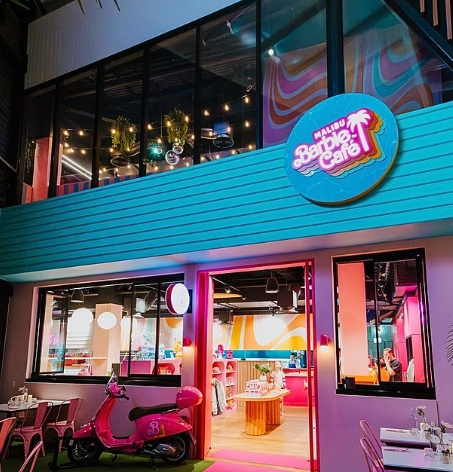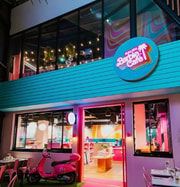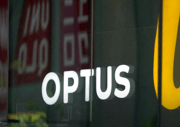
Imagine walking into a café, craving your morning coffee, only to discover there’s no cash option.
You reach for your card, expecting to pay the menu price, and then… bam—a mandatory 2 per cent surcharge hits your bill.
Suddenly, your latte costs more than advertised, and there’s no way to avoid it.
The controversy at Malibu Barbie Café
The controversy at Melbourne's Malibu Barbie Café has captured widespread attention after a customer vented their frustration on social media.
The Chadstone café, known for its flashy pink theme, operates entirely cashless while adding a 2 per cent surcharge on every card transaction.
'If there's no way to pay without a surcharge, the surcharge must be included in the displayed price.'
The ACCC's guidelines are clear: if customers cannot avoid a surcharge, it must be included in the advertised price.
Businesses are required to display the total price—the lowest possible cost—including any unavoidable fees.
Malibu Barbie Café’s method of listing one price while charging more appears to breach these rules, potentially misleading customers about the true cost of a product.
Café response and legal limits
When challenged, the café defended the fee as covering 'additional staffing and servicing required to deliver the Barbie Café experience, including immersive photo opportunities, themed hosts, and enhanced operational services.'
However, the law only allows surcharges to reflect the actual cost of processing a payment—not general operating costs like wages or electricity.
The federal government has been cracking down on excessive payment surcharges, with $2.1 million allocated to the ACCC in 2025 to tackle misleading fees.
The regulator has prioritised enforcement against such practices for the 2025-26 financial year, and a potential ban on debit card surcharges could take effect from 1 January 2026, pending Reserve Bank review.
Know your rights with payment surcharges
Surcharges can only be as much as it costs the business to process that payment type
If you can't avoid a surcharge (like at cashless venues), it must be included in the advertised price
Businesses can't include general operating costs like staff wages in surcharge calculations
You can report excessive or misleading surcharges to the ACCC
What it means for your wallet
For everyday Australians, unavoidable surcharges can feel like an extra burden.
The cost of processing credit cards generally ranges from 1 per cent to 1.5 per cent, while debit cards average around 0.5 per cent.
A flat 2 per cent fee on all cards, like Malibu Barbie Café charges, seems notably high and out of step with typical processing costs.
Many customers expressed annoyance online, capturing the frustration perfectly: 'I'm not gonna blink if the coffee is $5.30 instead of $5.20 but if it says $5.20 then you charge $5.30 I'll be mildly annoyed and may go elsewhere next time.'
If you encounter a business charging unavoidable surcharges that are not included in the advertised price, you have options.
The ACCC recommends speaking with the business first, as some operators may not fully understand the rules.
If this fails, a formal complaint can be lodged online, helping regulators monitor and enforce compliance.
Red flags for dodgy surcharges
- Cashless businesses that don't include surcharges in menu prices
- Flat percentage fees across all card types (should be different for credit vs debit)
- Businesses claiming surcharges cover general operating costs
- Surcharges that seem excessive compared to typical processing costs
- No clear disclosure of surcharge amounts before payment
Looking ahead
Consumers may soon see relief, with government initiatives aiming to lower household and business costs and improve competition in the payments system.
The potential 2026 ban on debit card surcharges could provide meaningful savings for card users.
In the meantime, questioning fees and reporting misleading practices can protect both yourself and other customers.
The Malibu Barbie Café case highlights the importance of consumer awareness and advocacy—one complaint can help ensure fairer pricing for all future visitors.
What This Means For You
Malibu Barbie Café faced significant backlash for charging a 2 per cent unavoidable card surcharge at its Chadstone location.
ACCC guidelines make it clear that any unavoidable surcharges must be included in the advertised price and cannot be used to cover general operating costs.
The federal government is actively funding ACCC enforcement against misleading surcharges and may even ban debit card surcharges from 1 January 2026.
Consumers who encounter such fees have the right to dispute them by speaking directly with the business or lodging a complaint with the ACCC.
Being aware of these rules means you can protect your wallet and avoid paying more than necessary, while also helping ensure businesses follow fair pricing practices.
If the Malibu Barbie Café incident left you wondering just how common these card surcharges are, there’s more to explore on the topic.
Many businesses are adding extra fees to card payments, sometimes without clear explanation, affecting everyday purchases.
For a deeper look at how these surcharges are quietly increasing costs at cafes and stores, this story offers valuable insights.
Read more: Cash or card? Why those extra fees are hitting your wallet harder than ever
Card surcharges | ACCC — Explains that if there’s no way to pay without a surcharge, it must be included in the displayed price.
https://www.accc.gov.au/consumers/pricing/card-surcharges
Card surcharges April 2025 Only charge what it costs you — Businesses must include unavoidable fees in the total price and inform customers of any pre-selected extras.
https://www.accc.gov.au/system/files/accc-card-surcharges-quick-guide.pdf
Card surcharges April 2025 Only charge what it costs you — Businesses cannot mislead customers and must display the total price as a single figure.
https://www.accc.gov.au/system/files/accc-card-surcharges-quick-guide.pdf
Card surcharges April 2025 Only charge what it costs you — Surcharges cannot include general operating costs like labour or electricity.
https://www.accc.gov.au/system/files/accc-card-surcharges-quick-guide.pdf
Reducing card surcharges for Australians and small businesses | Prime Minister of Australia — In 2025, the government funded the ACCC to tackle excessive surcharges and reduce payment fees.
https://www.pm.gov.au/media/reducing-card-surcharges-australians-and-small-businesses
Businesses reminded to review their card surcharges and pricing information | ACCC — Misleading surcharges and add-on costs are a compliance and enforcement priority for 2025-26.
https://www.accc.gov.au/media-relea...their-card-surcharges-and-pricing-information
Reducing card surcharges for Australians and small businesses | Prime Minister of Australia — The government plans to ban debit card surcharges from 1 January 2026, pending RBA review.
https://www.pm.gov.au/media/reducing-card-surcharges-australians-and-small-businesses
Reducing card surcharges for Australians and small businesses | Prime Minister of Australia — Highlights how the decline in cash use and rise of electronic payments is increasing surcharge costs.
https://www.pm.gov.au/media/reducing-card-surcharges-australians-and-small-businesses
Credit Card Surcharges in Australia in 2025 | Canstar — Credit card surcharges range from 1 per cent to 1.5 per cent, while debit card processing averages around 0.5 per cent.
https://www.canstar.com.au/credit-cards/credit-card-surcharges/
Businesses reminded to review their card surcharges and pricing information | ACCC — Businesses must disclose surcharges upfront and only charge what it costs to process payments.
https://www.accc.gov.au/media-relea...their-card-surcharges-and-pricing-information
Payment methods | ACCC — Consumers can report issues to the ACCC, which uses reports for education, compliance, and enforcement.
https://www.accc.gov.au/consumers/buying-products-and-services/payment-methods
Reducing card surcharges for Australians and small businesses | Prime Minister of Australia — Government aims to ease living costs and promote fairer pricing through improved payment systems.
https://www.pm.gov.au/media/reducing-card-surcharges-australians-and-small-businesses
Have you ever felt trapped paying extra fees at a cashless venue?







